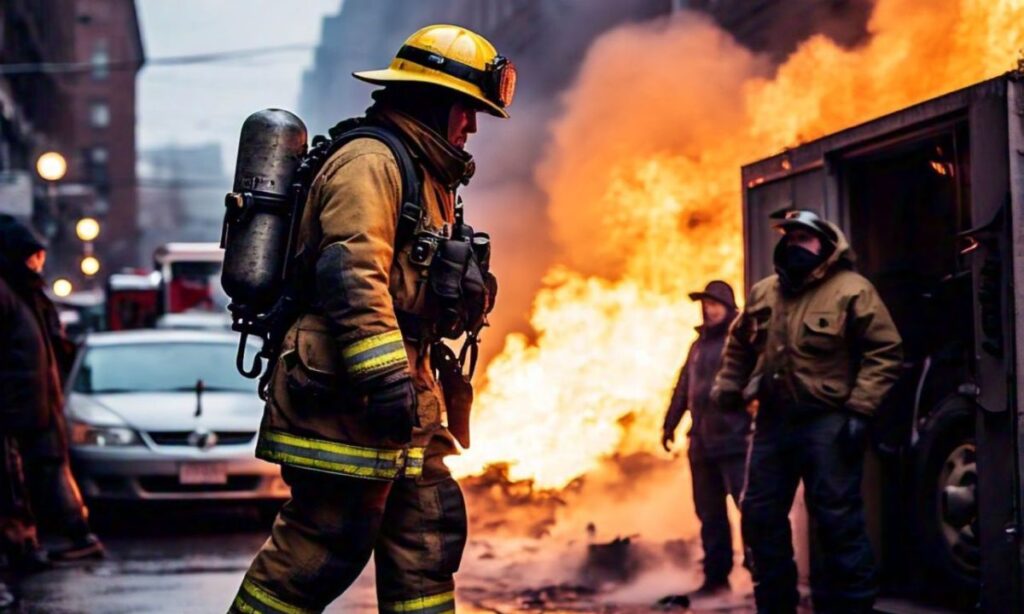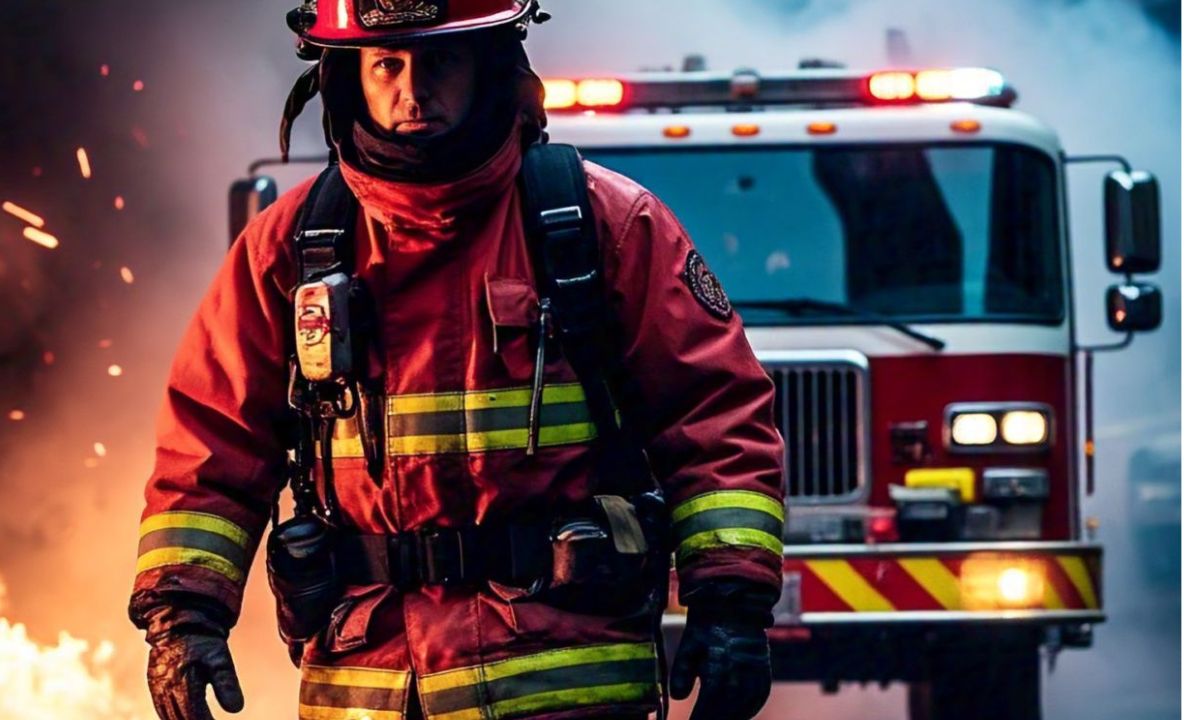Becoming a firefighter is a noble pursuit, but it is not without its challenges. The firefighting profession demands physical fitness, emotional resilience, and a dedication to public service.
Whether you’re aiming to join a local fire department or aspire to become part of a specialized team, there are several critical steps you must take to meet the requirements of becoming a firefighter.
Below is a comprehensive guide to help you understand the essential requirements, the process, and tips for standing out in this competitive field.
1. Meet Basic Eligibility Requirements

| Requirement | Details | Additional Information |
| Age Requirement | Minimum age of 18; maximum age varies by department. | Firefighter age and eligibility criteria vary by location. |
| Educational Requirements | High school diploma or GED; Fire science degree preferred. | EMT or paramedic certification enhances your employability. |
| Physical Fitness | Pass physical ability test (CPAT). | Focus on strength, cardiovascular health, and endurance. |
Before you can even think about the training and tests, you must meet the fundamental eligibility requirements. These include:
- Age: Typically, applicants must be at least 18 years old. However, some fire departments may have a maximum age limit, usually between 28 and 35 years old. These firefighter age and eligibility criteria can vary depending on the department.
- Driver’s License: A valid driver’s license is a necessity, as firefighters are required to operate emergency vehicles.
- Background Check: A clean criminal record is essential, as most fire departments will conduct a thorough fire department background check on potential recruits.
In some cases, junior firefighter programs are available for those under 18, offering opportunities to gain experience before reaching the minimum age.
Read this blog https://www.firerescue1.com/firefighter-training/articles/11-requirements-to-become-a-firefighter-FO0ZZpNdggP1GAmq/
2. Exceed Education Requirements
While a high school diploma or GED is the minimum educational requirement, obtaining a degree in fire science can significantly enhance your chances of being hired. Many fire departments prefer or require:
- Fire Science Degree: Completing a degree in fire science will provide you with both theoretical knowledge and practical skills related to fire safety, prevention, and firefighting techniques. Understanding the fire science degree benefits can help you determine whether this educational path aligns with your career goals.
- EMT or Paramedic Certification: Some departments require Emergency Medical Technician (EMT) certification, or in larger departments, a paramedic license. A combination of EMT certification for firefighters and medical training increases your employability and job versatility.
3. Get in Top Physical Condition

Firefighting career prerequisites often include passing the Physical Abilities Test (PAT), which assesses your physical readiness for the demanding tasks of firefighting. The typical firefighter PAT includes tasks like stair climbs, hose drags, equipment carries, and ladder raises. To prepare, focus on:
- Strength Training: Building your strength is crucial for tasks like lifting heavy equipment or performing rescue operations.
- Cardiovascular Fitness: Firefighting involves physical endurance, requiring you to perform intense activities over extended periods.
- Stamina: Incorporate endurance exercises into your routine, such as running or cycling, to build the stamina needed for long shifts.
A firefighter’s job is inherently physical, and preparing for the firefighter physical test preparation ensures you will be ready for the demands of the job.
4. Stay Out of Trouble
Fire departments will scrutinize your personal history, so maintaining a clean record is vital. This includes:
- Criminal History: If you have a criminal record, it does not automatically disqualify you, but honesty during the interview process is key. Own your past mistakes and demonstrate the positive changes you’ve made.
- Driving Record: Since firefighters must operate emergency vehicles, a clean driving record is a must. Be transparent about any incidents involving your driving history.
Tip: Being upfront about your past will show integrity and the ability to take responsibility for your actions.
5. Maintain a Professional Online Presence
With most fire departments conducting background checks, including social media reviews, it’s important to maintain a clean online presence. Consider:
- Cleaning Up Social Media: Delete any inappropriate posts, photos, or comments that may raise concerns for hiring panels.
- Professionalism: Ensure that your social media accounts reflect your professionalism and commitment to public service.
Remember, social media can be a powerful tool for networking but also a potential source of red flags if not managed correctly. Being aware of the social media and firefighter hiring policies will help you avoid common mistakes.
6. Show Financial Responsibility

A lesser-known but important aspect of becoming a firefighter is financial responsibility. Many fire departments will review your credit history as part of the background check process. A poor credit history could be seen as a lack of discipline or financial mismanagement. To improve your chances:
- Improve Your Credit Score: If necessary, take steps to improve your credit score by paying off debts and managing your finances responsibly.
- Fiscal Responsibility: Demonstrating fiscal responsibility shows that you can handle the pressures of the job both on and off the field.
7. Get Involved in Your Community
Community service for firefighter applicants is essential, as working in public safety is all about service to the community. Fire departments highly value candidates who show a commitment to public service. You can:
- Volunteer: Participate in community service, even if it is unrelated to fire safety. Volunteering with organizations like the Red Cross or Habitat for Humanity demonstrates your commitment to making a positive impact in the community.
- Fire Department Volunteer Programs: Volunteering at your local fire department, if available, gives you hands-on experience and shows your dedication to the profession.
Community involvement not only looks great on your application but also helps you gain valuable experience.
8. Pass the Written Exam
In addition to physical tests, you will likely need to pass a written exam that assesses your knowledge of firefighting concepts, safety procedures, and problem-solving abilities. To prepare:
- Study Firefighting Materials: Review fire science textbooks, safety regulations, and firefighting protocols.
- Firefighter Written Exam Study Guide: Familiarize yourself with the structure of the exam and practice multiple-choice questions to improve your performance.
The written exam is crucial, as it helps assess your theoretical knowledge and decision-making skills under pressure.
9. Prepare for a Psychological Evaluation
Being a firefighter means dealing with high-stress situations. A psychological evaluation will assess your emotional and mental stability. While you cannot study for this evaluation, preparing yourself mentally for the rigors of the job is essential. Focus on:
- Stress Management: Learn stress management techniques that will help you cope with the intense situations you will face.
- Emotional Resilience: The job will require emotional strength to handle the trauma and pressure of emergency situations. Understanding the firefighting mental health evaluation process will help you anticipate the evaluation’s focus.
10. Graduate from a Fire Academy
Most fire departments require recruits to complete formal training at a fire academy. The academy provides you with essential knowledge and skills, including:
- Firefighter I and II Certifications: These certifications, which are standard in most states, prepare you for the practical demands of firefighting.
- Fire Academy Entry Requirements: Each department has its own set of policies and procedures, so additional training will be necessary once hired.

Attending a fire academy, particularly a volunteer fire department, gives you the skills and knowledge you need to succeed in the field.
11. Ace the Interview
Finally, passing the interview is crucial to securing a position. Be ready to answer questions such as:
- Why Do You Want to Be a Firefighter?
- What Makes You a Good Candidate?
- How Do You Handle Stressful Situations?
Prepare by practicing common interview questions, demonstrating your passion for public service, and showing your commitment to the firefighting profession. Firefighter job interview tips can help you ace this part of the selection process.
FAQ’s
1. What is the minimum age to become a firefighter?
The minimum age is typically 18, though some departments may have a maximum age limit of 28 to 35 years old, depending on the firefighter age and eligibility criteria.
2. Do I need a college degree to become a firefighter?
While a high school diploma is the minimum requirement, many firefighters earn a degree in fire science or emergency medical services to improve their career prospects. Understanding the fire science degree benefits can help you determine if this path suits you.
3. How do I prepare for the firefighter physical abilities test?
Focus on building strength, cardiovascular fitness, and stamina. A comprehensive firefighter physical test preparation plan is essential for success.
4. Is it necessary to have EMT certification?
While not always required, having EMT certification significantly improves your chances of being hired and enhances your skills in emergency medical situations. EMT certification for firefighters is a valuable asset in the field.
5. What questions are asked in a firefighter interview?
Expect questions about your motivation for becoming a firefighter, your ability to handle stress, and your past experiences in emergency situations. Firefighter job interview tips can help you prepare for the selection process.
Conclusion
Becoming a firefighter requires a combination of physical fitness, education, emotional resilience, and community involvement. By meeting and exceeding the firefighting career prerequisites, you can position yourself for success in the competitive firefighting field.
Whether through obtaining certifications, improving your physical health, or volunteering in your community, every step you take brings you closer to a rewarding career serving others.
With hard work and perseverance, you can rise above the competition and become a firefighter who makes a difference
Read more informationhttps://techyspirtz.com/

David is a seasoned SEO expert with a passion for content writing, keyword research, and web development. He combines technical expertise with creative strategies to deliver exceptional digital solutions.














